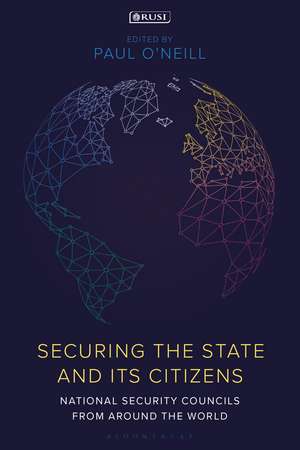Securing the State and its Citizens: National Security Councils from Around the World
Editat de Paul O'Neillen Limba Engleză Paperback – 29 iun 2022
| Toate formatele și edițiile | Preț | Express |
|---|---|---|
| Paperback (1) | 153.16 lei 3-5 săpt. | |
| Bloomsbury Publishing – 29 iun 2022 | 153.16 lei 3-5 săpt. | |
| Hardback (1) | 438.33 lei 6-8 săpt. | |
| Bloomsbury Publishing – 29 iun 2022 | 438.33 lei 6-8 săpt. |
Preț: 153.16 lei
Preț vechi: 166.29 lei
-8% Nou
Puncte Express: 230
Preț estimativ în valută:
29.31€ • 30.49$ • 24.20£
29.31€ • 30.49$ • 24.20£
Carte disponibilă
Livrare economică 24 martie-07 aprilie
Preluare comenzi: 021 569.72.76
Specificații
ISBN-13: 9780755642007
ISBN-10: 0755642007
Pagini: 264
Dimensiuni: 156 x 234 x 18 mm
Greutate: 0.34 kg
Editura: Bloomsbury Publishing
Colecția Bloomsbury Academic
Locul publicării:London, United Kingdom
ISBN-10: 0755642007
Pagini: 264
Dimensiuni: 156 x 234 x 18 mm
Greutate: 0.34 kg
Editura: Bloomsbury Publishing
Colecția Bloomsbury Academic
Locul publicării:London, United Kingdom
Caracteristici
Each chapter is written by a country expert, most from in-country practitioners or academics that explore how their different nations have approached the challenge of coordinating responses to complex and diverse threats to their national security
Notă biografică
Paul O'Neill is a Senior Research Fellow in Military Sciences at RUSI with research interests in organisational aspects of security and defence. He was previously a senior Royal Air Force officer working in strategy and human resources roles across Defence including in Whitehall.
Cuprins
Foreword by Lord Mark Sedwill Introduction (Paul O'Neill)1. National security structures in Africa (Ann M. Fitz-Gerald) 2. Argentina and the long quest for a National Security Council(Martin Verrier)3. National security in Canada (Hugh Segal and Ann M. Fitz-Gerald) 4. Colombia's National Security Council and the fluid architecture for presidential counselling (Oscar Palma) 5. Centralized decision-making in France: The non-permanent Defence and National Security Council (Patrick Chevallereau) 6. A National Security Council: Georgia's historic challenge to get it right (Natia Seskuria) 7. Ghana's National Security Council: Negotiating institutional and political decision-making processes(Kwesi Aning and Naila Salihu) 8. India's National Security Council: Addressing a strategic gap (Aaditya Dave)9. Iraq's National Security Council: From Repression to Inclusive Security (Manuel Almeida and Aram Habeeb)10. Israel's National Security Staff comes of age (Charles (Chuck) Freilich) 11. Japan's National Security Council since 2013: The Abe and Suga administrations (Yasuhiro Matsuda)12. Kenya's National Security Council: Balancing democratic control and executive power (Singo S. Mwachofi)13. New Zealand: Small but integrated (Jim Rolfe)14. Disjointed security: Assessing Norway's national security sector(Anders Romarheim)15. South Africa: In search of both security and process (Abel Esterhuyse)16. The National Security and Defence Council of Ukraine: Responding to state aggression (Hanna Shelest)17. The British National Security Council: It takes a village (Catarina Thomson)18. Washington's 'Keepers of the Keys' (Frank Hoffman)19. Case study analysis (Paul O'Neill)20. The orchestration of National Security Systems: The NSC as conductor (Paul O'Neill)AfterwordAuthor biographies Selected Further Reading Endorsements Index
Recenzii
It is an excellent idea to review the different approaches countries have taken in building their security organisations. I regret that this sort of book was not around when we were designing New Zealand's system. Where we had largely to rely on our own circumstances, we can now compare and learn from the wider experience of many others from across the world
A timely and much-needed comprehensive study of national security structures building upon the experiences of different countries, political systems and strategic cultures. An invaluable reference for academicians, political analysts, foreign policy experts and practitioners working in the field.
A timely and much-needed comprehensive study of national security structures building upon the experiences of different countries, political systems and strategic cultures. An invaluable reference for academicians, political analysts, foreign policy experts and practitioners working in the field.
